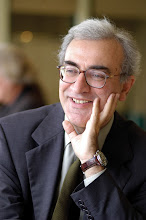.
Brilhante conclusão de um excelente post de Frances Coppolla:
The Austerity game is as much an avoidance of reality as the preceding
Profligacy game. We do not have to cut support to the poor and
vulnerable. We do not have to increase people's tax burden. We do not
have to pour money into banks in the hopes that they will lend to people
who already have too much debt. We do not have to suppress interest
rates to extract money from savers. We do not have to bail out foreign
creditors at the expense of domestic production (are you listening,
Greece?). And above all, we do not have to accept that money is scarce.
If it is scarce, it is because we have made it so. And in the developed
world, where goods are anything but scarce and can be produced at very
little cost, it is a disgrace that people are increasingly
poverty-stricken because of shortage of money. I am reminded of Steinbeck's
description of fruit, fallen from the trees and left to rot because
consumer prices had fallen so low it was not worth farmers' while to
pick it, being ruined with petrol to prevent the starving migrants from
the drought-stricken American Mid-West from taking it. Nowadays, of
course, we wouldn't use petrol - it's too expensive - but there are
other ways of preventing people from getting the necessities of life for
nothing.
What is needed is for economists and politicians to put their various
ideologies to one side and take a hard look at how the economy ACTUALLY
works, and what is really going on. Shortage of money is not the
problem: allocation of money is the issue. Money is being created, but
it is not going where it is needed, and this leads to unnecessary
shortages of goods that actually are in abundant supply. That is the
defining characteristic of both games - Profligacy as much as Austerity.
The underlying reality is gross inequality and misallocation of
resources. Until the world recognises this, we are doomed forever to
play out the same sequence of games.
.
14.12.12
Subscrever:
Enviar feedback (Atom)




1 comentário:
Coppolla não descobriu, nem está a dizer, nada de novo. O problema é a distribuição, claro. Mas a distribuição não se resolve apenas distribuindo. Para já, tem um custo, por vezes mais alto do que a produção. Depois, parte do valor de um produto deve-se à sua escassez (a outra parte será o seu valor intrínseco, ou seja, a necessidade que satisfaz). Portanto, quem produz tem sempre interesse em que a procura seja maior do que oferta... Resumindo uma longa história: o problema é ético.
Enviar um comentário